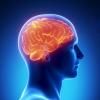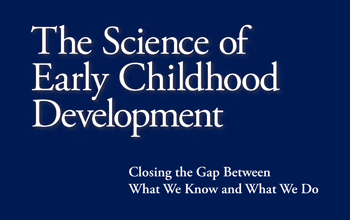- Define cognitive development.
- Identify practices that you can use to support cognitive development in your program.
Learn
As an adult, you have already developed many of the thinking skills that help you navigate the world around you. Think about the skills and strategies that have helped you succeed at daily tasks like:
- Reading and following the recipe for a new meal
- Finding a different way home when traffic is heavy
- Estimating the amount of material you'll need for a home improvement project
- Finishing a book and discussing it with friends
- Filling out a job application
- Fixing a leaking faucet or pipe
- Budgeting for groceries and other essentials
What thinking skills helped with these kinds of tasks? Reading, writing, measuring, calculating, problem-solving, hypothesis testing, comprehending, and recalling facts all are essential for many of the tasks you accomplish every day. You started developing those skills as a child, and they continue to develop as you encounter new situations as an adult.
What is Cognitive Development?
Cognitive development is all about learning. When a child imitates an adult, that's cognitive development; when a child makes a "ruff" sound when they see a dog, that's cognitive development; and when a child smiles upon hearing a familiar voice, that's cognitive development. Cognitive development happens all the time and is influenced by both our genes and our experiences.
According to Dodge, Colker, and Heroman (2002), "Cognitive development refers to the mind and how it works. It involves how children think, how they see their world, and how they use what they learn." Who children become has everything to do with the experiences they have early in their lives. Brains are built over time, and each experience affects growth and development. While genetics are important, the interplay between genes and experiences is the focus of research today. While the brain can be influenced at any age, it is the most pliable in the early years.
Scientists no longer debate which is most important, genetics or experience; the same is true for which developmental domain is most important. All of the domains of development are important, and they are inextricably linked. Carol Dweck of Stanford University says, "We can't carve people up-there isn't the cognitive person, the emotional person, the motivational person, the social person. All of these co-occur in the brain" (Galinsky, 2010).
High-Quality Learning Programs Make A Lasting Difference
Multiple studies have identified factors that improve educational outcomes for children. The factors are: skilled personnel, small group sizes, appropriate staff-to-child ratios, warm and responsive interactions, and a developmentally appropriate curriculum. It is critical that you are able to articulate what it means to teach children and youth effectively, create environments that are conducive to learning, and implement the staff training and support systems that help staff members achieve important goals.
You help create a climate that promotes the optimal development and learning of children and youth. Fostering a spirit that encourages new ideas and allows for mistakes is the underpinning of a culture that supports ongoing professional development. That, in turn, supports cognitive development in children and youth. You help staff members offer the experiences, environments, and interactions that prepare children to learn. In other words, you are a difference maker.
Training & Coaching Practices That Support Cognitive Development
As a training and curriculum specialist, you support adult learners. Those adult learners, in turn, support the development of the infants, toddlers, children, and youth they serve. To do this important work, you should:
Finally, take a minute to reflect on how training and curriculum specialists support the needs of staff members across program areas. Listen as this training and curriculum specialist describes her role in adult learning and professional development.
Supporting Adult Learners
Completing this Course
For more information on what to expect in this course and a list of the accompanying Learn, Explore and Apply resources and activities offered throughout the lessons, visit the Training & Curriculum Specialist Course Guide.
To support the professional development of the direct care staff members or family child care providers you oversee, you can access their corresponding Course Guides:
- Infant & Toddler Cognitive Development Course Guide
- Preschool Cognitive Development Course Guide
- School-Age Cognitive Development Course Guide
- Family Child Care Cognitive Development Course Guide
Explore
How do you define cognitive development? What experiences have helped you develop as a learner? Take a few minutes to read and respond to these questions. Then, think about how you can use what you know about your own learning to help staff members, children, and families. Talk with your program manager about ways your program can improve its approach to supporting cognitive development.
Apply
We know more now than we ever have about how best to promote positive growth and development in children and youth. Yet an alarming number of children and youth aren’t realizing their full potential.
Read “The Science of Early Childhood Development: Closing the Gap Between What We Know and What We Do,” a publication from the National Scientific Council on the Developing Child.
After reading the article, use the Understanding Cognitive Development: A Reflective Exercise to answer the questions based on your reading. Administrators in the management track will have read the same article in their course, so you can have a discussion about what it means for your program.
Demonstrate
Chick, N. (n.d.). Metacognition: Thinking about One's Thinking. Nashville, TN: Vanderbilt University Center for Teaching. Accessed from http://cft.vanderbilt.edu/guides-sub-pages/metacognition/
Copple, C., & Bredekamp, S. (2009). Developmentally Appropriate Practice in Early Childhood Programs Serving Children from Birth through Age 8, Third Edition. Washington, DC: National Association for the Education of Young Children.
Dodge, D. T., Colker, L. & Heroman, C. (2002). The Creative Curriculum for Preschool. Washington, DC: Teaching Strategies, Inc.
Galinsky, E. (2010). Mind In The Making: The Seven Essential Life Skills Every Child Needs. New York, NY: William Morrow Paperbacks an Imprint of Harper Collins Publishers.
The Center for The Developing Child, Harvard University: http://developingchild.harvard.edu



